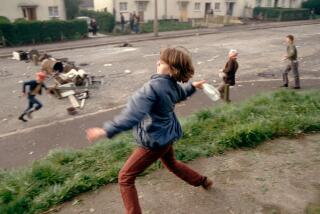Ingenious were the peacemakers in Northern Ireland
- Share via
For decades the conflict in Northern Ireland virtually defined the term “intractable.” A civil war that broke out in the late 1960s but reflected centuries of discrimination against Catholics cost more than 3,000 lives. Beginning in the 1970s, Britain and the Republic of Ireland tried to bring about reconciliation, but were repeatedly sabotaged by sectarianism and petty bickering.
And yet, as two developments in recent days remind us, the patience and ingenuity of the peacemakers -- including the United States, which midwifed the 1998 Good Friday Agreement -- have produced an end to widespread violence and the beginnings of a pluralistic political system. Last week, British, Irish and Northern Irish politicians reached an agreement on an issue that had threatened to end power-sharing: police and judicial systems that could command the support of both communities. And on Monday, the Irish National Liberation Army and two other splinter paramilitary groups announced that they had disarmed to the satisfaction of international observers.
Any breakthrough in Northern Ireland must be accompanied by the caveat that the situation could still deteriorate. But, thanks to the courage of successive British and Irish governments and, yes, the consent of “hard men” with blood on their hands, an uneasy consensus has been established. Britain and Ireland agree that the people of the North have the right to decide whether they will remain part of Britain or join a united Ireland; meanwhile, Protestants and Catholics will share power. Terrorists have been released, and groups such as the Irish Republican Army have been rewarded for disarming.
Perhaps most important, the peacemakers recognized that it wasn’t enough to enlist moderates in the cause of compromise. The result is a coalition government in Belfast presided over by a “first minister” from the Democratic Unionist Party, long led by the demagogic Protestant preacher Ian Paisley, and a deputy first minister from Sinn Fein who was once an IRA officer.
It’s tempting to try to apply some of these strategies to that other “intractable” conflict, the one in the Holy Land. In one respect, they seem unlikely to work: Israelis and Palestinians don’t appear eager or capable of sharing power in a nonsectarian state. Yet elements of the Irish experience offer lessons -- such as the decision to combine toughness on terrorism and an engagement with political movements that have committed or countenanced it.
Whatever lessons the peace process can teach others, it has rescued the people of Northern Ireland from violence and created at least the possibility that ancient grudges will yield to common progress.
More to Read
Sign up for Essential California
The most important California stories and recommendations in your inbox every morning.
You may occasionally receive promotional content from the Los Angeles Times.













